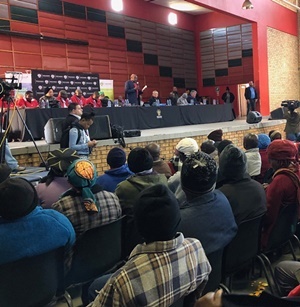
It's NOT the economy, stupid. Well, not entirely. This is
what white people need to understand about black people's hunger for land.
Black and white South Africans think differently about land. That much is clear from the Constitutional Review Committee's public hearings on amending Section 25 – the property clause – of the Constitution in the Northern Cape, Free State and KwaZulu-Natal, which I attended.
I recall only one white person, a woman, supporting expropriation without compensation at the hearing in Welkom. White speaker after white speaker, the majority of them male, spoke about land in economic terms.
Each and every one lamented that expropriation without compensation would have a dire effect on the economy and food security. Many of the white speakers represented farmer's unions and producers' organisations.
To my surprise, a love for and a strong bond to the land didn't feature strongly in the white farmers' presentations.
Black speaker after black speaker, the majority of them male, spoke about a history of dispossession and how its effects – which continue to this day – lead to a loss of dignity and economic exclusion. Many viewed expropriation without compensation as a way to remedy this.
The difference here is that for black people land is not just a commodity, a means to an economic end. My impression is that it is about much more. It is about dignity, identity, a connection to the land of their forebears. Yes, economics plays a part, but it is not the primary focus. It's about much more. Also keep in mind that the majority of blacks in this country, and I would guess the majority of those who participated in the hearings, are still to a large extent excluded from the economy. Why would they want to maintain a system that has only been screwing them?
Of course, in this capitalist society land cannot be divorced from economics, it is a means of production as the Marxists would say. It should form an integral part of the debate. But the vast majority of white speakers' sole focus on the land issue in economic terms didn't help the larger debate.
While several white speakers, especially those representing farmers' bodies, acknowledged the injustices of the past, expressed a commitment to land reform and some said, I believe honestly, that they want to see a transformed agricultural sector and successful black farmers, I didn't get the impression that there was much empathy with the plight of black people in relation to land.
I know this is hard. As a white person I'll never understand what it is like to be a descendant of a group of people whose culture, wealth, sense of pride and dignity were decimated by years of forceful dispossession. (As a white, Afrikaans person I do understand what it is like if much of your heritage is based on a bunch of lies, but let's not get into that now.)
I do believe that if white people contribute to this debate with more humility, an expression of sympathy to our black compatriots and a sincere commitment to redress, it would blunt the sharpness of this divisive debate and maybe, just maybe, create some common ground. Banging on about land in economic terms doesn't do much to dispel the notion held by some of the more militantly atavistic black speakers at the hearings that whites are "settlers" wanting to live off the fat of the land at the expense of the rest of the population.
While the only thing most people agreed on is that the ANC government's land reform policies have failed since the dawn of democracy, the level of focus on the economy wasn't the only racial fault line that reared its head in the hearings. Whites typically spoke in individual terms – "I bought my farm" – while blacks typically spoke in collective terms – "Our land was stolen". There was also a much larger sense of history in black people's submissions, while some whites wanted bygones to be bygones.
A white farmer went as far as to say you can't eat historical arguments. Well, you can't eat continued injustice either.
- Jan Gerber is one of News24's parliamentary reporters. Back in the day, he did an MPhil in Political Management, with land reform as the topic of his thesis.
Disclaimer: News24 encourages freedom of speech and the expression of diverse views. The views of columnists published on News24 are therefore their own and do not necessarily represent the views of News24




 Publications
Publications
 Partners
Partners

























